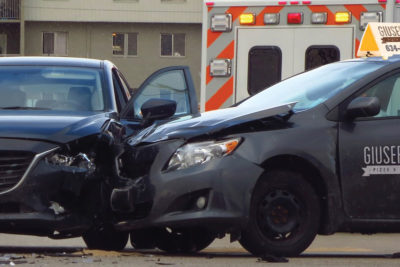As a business owner, you will occasionally find yourself in a situation where this particular coverage is needed. If you think about it, rental situations and errands often come up from time to time.
Even the smallest business needs commercial auto coverage if it operates any vehicles. If the business owner’s vehicle doubles as both a business and personal vehicle, commercial auto coverage is needed. A personal auto policy (under most circumstances) will not cover you in a loss if you are using the vehicle for business purposes. As a side-note, you do not have to own a business vehicle obtain this coverage; it can be added to your general liability policy.
So what if one of your employees uses their own vehicle for company business and is involved in an accident? Your business could be liable for the damages. You can protect your business by adding the non-owned coverage endorsement. Hired auto coverage is a similar protection for your business. This endorsement offers protection for your business from liability claims brought about by a third party that suffered injury resulting from an accident where the vehicle involved is not owned by you or your business.
Hired Auto Coverage – provides liability protection for your business when you’re driving a vehicle that is neither registered to you or your business. Example – Hired Auto offers liability coverage for a rented vehicle.
Non-Owned Coverage – This coverage protects your company in the event you are sued for an accident that occurred while an employee was on company business while driving a personal vehicle. It protects the company while supplementing the driver’s personal auto liability coverage.
Is this coverage really a necessity for my business? Absolutely! You may find yourself using an employee automobile or an auto that you do not own for business purposes, such as an errand to the bank or post office, or picking up lunch for the office. An auto liability claim for an injury can be very expensive. If you are the owner of a small business, keep in mind that an auto liability claim may possibly be the single most financially significant risk you may face. In comparison, this endorsement is very inexpensive to be added. If an employee of your company is involved in a serious auto accident while driving their own vehicle or a rented vehicle on company business, your company can be held responsible if their personal insurance is not adequate to cover the claim.
Tips for business owners: You should both audit and budget your commercial auto policy annually. If you were to take these extra steps, they could help your business in the future. By performing an audit, you can figure out the extent in which your business relies upon either rented vehicles or those not owned by the business. As a business owner it is your responsibility to purchase a sufficient amount of insurance, considering those operating or owning the rented or used vehicle may not have the proper coverage or enough coverage in place.
Below are various business scenarios that often affect small businesses involving a “hired auto” risk:
- Your business employs a specific type of employee who needs to be taxied to the job site location. Example – Immigrants, migrant workers, students, members of Amish community
- Your business has a peak or seasonal period where you rely on rental or leased vehicles. Example – Your ice cream shop in New York doesn’t get much business in the winter, so you rent a truck to ship your product to the South Carolina shop.
- Your business employs haulers or subcontracts out delivery vehicles. Example – A farmer who ships his crop though a hired trucking company.
- Your business employs sales representatives who fly to their destination and travel around in a rented vehicle. Example – You have a sales representative who must travel to cities around the country to meet with potential clients.
These examples are just a few potential liability scenarios. To best protect yourself and your business, you should discuss the uses of vehicles [on behalf of the business] by employees or subcontractors with one of our trusted agents.



